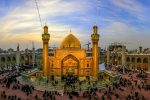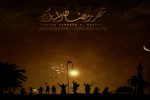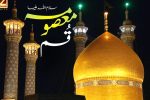Wilayat of Ali (A.S.) is a Strong Fort of Allah Almighty
Wilayat of Ali (A.S.) is a Strong Fort of Allah Almighty One of the traditions concerning the position of the Shias and the lovers of Ahl ul-Bayt (a.s.) states that the fire of Hell cannot scorch them. Thus, these types of traditions impart strength to our hope. Our love for the Ahl ul-Bayt (a.s.) is […]

Wilayat of Ali (A.S.) is a Strong Fort of Allah Almighty
One of the traditions concerning the position of the Shias and the lovers of Ahl ul-Bayt (a.s.) states that the fire of Hell cannot scorch them.  Thus, these types of traditions impart strength to our hope. Our love for the Ahl ul-Bayt (a.s.) is certainly a surety for us but it should not tempt us to commit sins blatantly.
Thus, these types of traditions impart strength to our hope. Our love for the Ahl ul-Bayt (a.s.) is certainly a surety for us but it should not tempt us to commit sins blatantly.
Shia and Mohib
The traditions regarding this subject are based on two important points. The first is concerned with ‘Shia’ and the second ‘Mohibs’ (Admirers) of the Holy Ahl ul-Bayt (a.s.). The position and status of those Shias who have achieved excellence in the field of knowledge and good deeds is definitely higher. Even so, such people did not consider themselves fit to be called the Shias of Ahl ul-Bayt (a.s.). Take the example of Muhammad bin Muslim Thaqafi. He was the honourable companion (Sah?bi) of Imam Muhammad Baqir (a.s.) and Imam Ja’far as-Sadiq (a.s.). Both the Holy Imams (a.s.) have recommended him to the Shias for solving their religious problems. Muhammad bin Muslim Thaqafi has also been mentioned as the greatest Jurist of his time in the books of Rijal (Chain of narrators).
On one occasion Muhammad bin Muslim along with Abu Karibatul Azdi went to see Qazi Shar?k. Shar?k glared at him in anger and said, “These two are Ja’fari and Fatimi!” [Shias of Ahl ul-Bayt (a.s.)]. Upon hearing this, both of them began to cry bitterly. When the Qazi enquired the reason for their lamentation, they replied, “You have associated us with such a lofty personality [Imam Ja’far as-Sadiq (a.s.)]!. Are people like us who lack in piety and abstinence to be compared with such an exalted person? What connection does the dust have with the Divine existence? (A Persian saying). We shall be highly obliged to you if you can accept our request (and give us not the title that we do not deserve).”
The True Shias are those Who Follow (Obey) the Imams (a.s.)
Yes, we can give the title of ‘Shia’ to that individual who follows the Imams (a.s.) in all aspects of character and speech. Thus, Bab-ul-Hawaij Imam Musa al-Kadhim (a.s.) says:
“Our shias are only those who follow us (in every respect), walk in our footsteps and imitate our actions.” (Bih?r al-Anw?r)
On a certain evening ‘Ali (a.s.) was departing from the mosque. The surroundings were bright due to the moonlight. He saw behind him a group of people walking towards him. He enquired as to who they were? They said: “We are your Shias.” ‘Ali (a.s.) looked at their faces carefully and said.
“Why is it that your faces do not exhibit any sign of you being a Shia?”.
“Master, what are the signs of a Shia?”
“Their faces are pale due to excessive worship and the fear of Allah, their backs are bent due to prolonged prayers, too much fasting causes their abdomen to touch their backbones, their lips become dry be repeating endless invocations, and their hearts are filled with the fear of Allah.”
(Bih?r al-Anw?r, Al-Irshad).
Now I will quote three traditions for the benefit of the readers.
Mere Claim is not Sufficient
1) Jabir (a.r.) relates from Imam Ja’far as-Sadiq (a.s.) that he said,“Is it sufficient for one to associate himself with Shiaism and say that, “I am a lover of Ahl ul-Bayt (a.s.)? By Allah, our Shia is not, but the one who fears Allah and obeys His Commands.” (al-K?fi)
2) Imam Ja’far as-Sadiq (a.s.) told Mufazzal bin Umar,“If you wish to see one of our devotees then look for that person who abstains from sins and fears more His Creator and remains hopeful of His reward. Whenever you find such an individual then take it for granted that he is one of my devotees.”
3) Isa bin Abdullah Qummi entered in the presence of Imam Ja’far as-Sadiq (a.s.). The Imam said, “That person is not from us nor do we hold him in esteem, the one who, if he lives in a town of a population of hundred thousand and there is even one non-Shia who is more pious than him.” (al-K?fi).
Thus the belief, actions and the piety of the Shias of Ahl ul-Bayt (a.s.) should be such that they should be the best and none should excel them. Allah (S.w.T.) has defined such people ‘Khairul Bar?ya’ in the Holy Qur’an:
“(As For) those who believe and do good, surely they are the best of men.”
(Surah al-Bayyina 98:7)
The Holy Prophet (S) is reported to have explained that ‘Khairul Bar?ya’ connotes the Shias of ‘Ali (a.s.): “O ‘Ali, ‘Khairul Bar?ya’ means you and your Shias. On the Day of Judgement, they would be satisfied with what Allah has bestowed upon them and they shall be liked by Allah.
(Tafs?r Tabarsi, Manaqib Khw?razmi, Ibn Hajar).
Wilayat
There is not an iota of doubt that the one who possesses the Wil?yat of Ahl ul-Bayt (a.s.) would be deserving of salvation. In fact, he shall be with the Prophets (S) and the Pure Imams (a.s.). Imam Ri?a (a.s.) said:
“Allah shall collect our Shias on the Day of Judgement in such a condition that their faces shall be aglow with (radiance). His arguments would be lighted (manifest) and his proof shall be obvious before Allah. It is upon Allah to collect our Shias with the Prophets, the martyrs and the truthful ones on the Day of Judgement. These personalities are the best of the loyalists.” (Bih?r al-Anw?r)
The Meaning of Wilayat
It is written in the book Majmaul Bahraen regarding the meaning of the word ‘Wil?yat’: “Wil?yat is the love for Ahl ul-Bayt (a.s.), the natural consequence of which is to follow them in religious matters, to fulfil the obligations laid down on us and to abstain from the things prohibited. Wil?yat is to walk in the footsteps of the Ahl ul-Bayt (a.s.) following their ways in deeds, behaviour and manner of speech.”
Wil?yat therefore means love and obedience. This idea is supported by a tradition from Imam Muhammad al-Baqir (a.s.) wherein the Holy Imam (a.s.) has related love with obedience.
Wilayat of ‘Ali (a.s.) is a Strong Fort of Allah (S.w.T.)
The tradition explaining this concept is to be found in the tradition of Silsilatuz Zahab. It is related by Imam Ja’far as-Sadiq (a.s.) from Imam Ri?a (a.s.). It is as follows:
“Allah says, “The Wil?yat of ‘Ali Ibn Abi Talib is My fort. Then one who enters My Fort is safe from My wrath (Ghazab).” (Uy?n al-Akhb?r ar-Ri?a).
There is no doubt that entering the Wil?yat of the purified Ahl ul-Bayt (a.s.) implies taking refuge with the Ahl ul-Bayt (a.s.), to abstain from all unlawful acts and to remain aloof from their enemies. The word “Tahassum” denotes ‘taking refuge in an established fort’ and it also suggests that the refuge is not only physical in nature but of a moral form (in spirit) as well. It is therefore imperative to take refuge with these exalted personalities and to follow their superior examples in all aspects of speech and behaviour. In short one who follows them has actually taken refuge in their fort.
Verbal Claim Unaccompanied by Actions is Insufficient
After describing the qualities of the Shias, Imam Muhammad Baqir (a.s.) observed;“O Jabir, is it enough for one, to say that ‘I love ‘Ali (a.s.) and I have achieved his Wil?yat,’ whereas he does not act upon it?”
“If someone says, “Surely, I love the Holy Prophet (S) because he was superior to ‘Ali (a.s.) and I am Shia al-Muhammad.” Inspite of this claim he does not follow the Ahl ul-Bayt (a.s.) whom the Holy Prophet (S) had ordered to follow. It is surprising that even after claiming to love the Prophet they do not follow his Purified Progeny (Ahl ul-Bayt a.s.). Mere claim of love is not sufficient.”
Success is through Actions Alone The tradition continues, “O Jabir, the nearness of Allah is not achieved without His obedience. When our Shias do not have obedience and action (to their credit) we have no authority to free them from Hell. Merely a verbal claim, “I am a Shia” is not sufficient argument for Allah. (If Allah wills he can involve him in punishment; Allah has not promised to bestow salvation upon the claimants of Shiaism- the criteria are obedience and good actions). Then, only one who obeys Allah is our Wal? (lover) and the one who is a sinner is our enemy and our Wil?yat cannot be achieved but by piety and good deeds.” (al-K?fi)
Types of Taqwa According to Allama Majlisi
According to Allama Majlisi (r.a.) there are four types of ‘Taqwa’
: 1. “Wara at-Ta’b?ri”, which means to abstain from the prohibited things.
2. “Wara as-Salih?n”, to abstain from doubtful things so that one may not commit a Har?m act.
3. “Wara al-Muttaq?n”, to abstain from permissible things so that one is absolutely protected from ‘Har?m’.
4. “Wara as-S?diq?n”, to avoid everything that is not religious so that one may not waste precious time in useless acts, even though there may not be any risk of committing a sin.
Love
According to traditions, both from the Shia and the Sunni sources, it is established that love protects one from being a slave of one’s desires and Shaitan. This is because the love of an exalted personality entails that we also love his friends and hate his enemies. The friendship of Shaitan and the following of one’s evil desires are two of the biggest hurdles in one’s love for Allah (S.w.T.) and the Ahl ul-Bayt (a.s.).
Insha’Allah the followers of ‘Ali (a.s.), by the blessing of his love will remain away from the path of Shaitan. Thus, love (for Ahl ul-Bayt) protects one from evil rather than make him susceptible to sins. In order to explain this idea a few traditions are mentioned below:
Love Makes a Man Steadfast
Imam Muhammad Baqir (a.s.) has said,“Whoever has been bestowed the love of ‘Ali (a.s.) in his heart by Allah, is not prone to wavering (from his path) but he becomes steadfast (on the path of Allah) and also towards other (matters).” (Bih?r al-Anw?r)
The Testimony of Jabir Ibn Abdullah Ansari (r.a.)
Hazrat Jabir Ibn Abdullah Ansari (r.a.) says: If the first step of the lovers of Ahl ul-Bayt (a.s.) is in the wrong direction due to excess sins the next step is guided aright by (the grace of) their love. (Safinat’ul-Bih?r)
The Angels Seek Forgiveness for the Partisans of ‘Ali (a.s.)
According to the traditions of the Ahl ul-Bayt (a.s.), it is an established fact that even the angels ask forgiveness (on behalf) of the followers of ‘Ali (a.s.). A tradition is quoted in Bih?r al-Anw?r from the Sunni sources in this regard. Anas relates from the Holy Prophet (S) that he said, “Allah has created seventy thousand angels from the light of ‘Ali Ibn Abi Talib’s face. These angels will (continue to) ask forgiveness (on his behalf and on the behalf of his devotees) till the Day of Judgement.”
Devotion for ‘Ali (a.s.) Consumes Our Sins
The love and devotion for Hazrat ‘Ali (a.s.) destroys one’s sins as is proved by the numerous reports. Bih?r al-Anw?r has the following tradition related from the Holy Prophet (S) by Ibn Abbas (r.a.):
“Love of ‘Ali (a.s.) consumes the sins like fire consumes wood.”
There is a Persian ‘Qata’ (four-line poem) which summarises this discussion as follows:
The love of ‘Ali (a.s.) removes the darkness of the heart like the moon and the stars illuminate the night. Salvation will be based on ones love for him and not ones worship deeds.
But those who are his devotees, must also rely upon the Merciful (God). We should not be satisfied only with this devotion and forget Allah (S.w.T.).
Difficulties and Calamities Nullify the Sins
The Almighty Allah (S.w.T.) imposes difficulties and sends calamities to the sinful people among the followers of Ahl ul-Bayt (a.s.) This is because He wishes to cleanse them of their sins so that they are not liable to any punishment after death. If the sins are more, then he gets a difficult death and if the sins are still in excess then he is punished in Barzakh (grave) upto the Day of Judgement.
It is also stated in the traditions that if there is a sinner whose sins are so much that even after all the punishment they are not expiated; then that person will be interned in the Hell-fire till he has recompensed for the remaining sins. The devotee of Ahl ul-Bayt (a.s.) shall not remain in the fire forever. The everlasting punishment is only for the unbelievers and the enemies of Ahl ul-Bayt (a.s.)
The Rewards are Proportionate to the Intensity of Love
Another point to be remembered is that, the intensity of one’s devotion is the means for the early forgiveness of ones sins. If love is more, the intercession is swift. Even the painful moments of death are converted into comfort by the help of Ahl ul-Bayt (a.s.). There was a poet by the name of Sayyid Himyari who died in 173 A.H. He was an ardent devotee of Hazrat ‘Ali (a.s.) and has composed a Qasida (panegyric) on each and every quality of this exalted personality. Whenever there was a Majlis (gathering) in the honour of Ahl ul-Bayt (a.s.) he always insisted upon reciting one of his poems. Various books of the Shias and Sunnis, like Al-Ghad?r (vol.3), Kitab Aghani, Manaqib Sarwari, Kashful Ghumma, Am?li of Shaikh Sad?q, Basharatul Mustafa and Rij?l Kashi mention about him. The following is the gist of the miraculous happenings at the time of his death.
Sayyid was very handsome and fair. At the time of his death he was surrounded by people. Among them were also those who were opposed to the Shias. The condition of the Sayyid deteriorated and all of a sudden a black spot appeared on his face. The stain spread on his face and his complete face turned charcoal black. The opponents were pleased to see his discomfort. The pain caused the Sayyid to lose his consciousness. When he regained his senses he turned towards Najaf al-Ashraf and pleaded: “O Amir ul-Mu’min?n ‘Ali (a.s.). O the centre of the hope for helpless people. Do you deal with your devotees in this way?” He repeated this phrase twice more. No sooner did he complete his entreaty that a spot of whiteness became visible on his face. It spread upon his face and soon his face became radiant once again like a full moon. Sayyid was filled with joy, and recited the following couplets extemporaneously.
“Who said ‘Ali (a.s.) could not save his followers from difficulties lied. I swear upon my Creator that I have entered Paradise with my sins all forgiven. I give this good news to those who are devoted to ‘Ali (a.s.) till death. And after him revere his eleven descendants who are the Imams.”
After reciting these couplets he confessed to the Oneness of Allah (S.w.T.) and the Prophethood of the Holy Prophet (S) and the Wil?yat of Amir ul-Mu’min?n (a.s.). Then he closed his eyes and departed from this world.
Evil Desires are a Barrier to Devotion
Sometimes the desire of this world and its material comforts can cause the love of Ahl ul-Bayt (a.s.) in ones heart to decrease. An excess of such desires may even make the heart bereft of the love of Ahl ul-Bayt (a.s.). Such a person when he approaches his last moments will obviously not get any help from the material he had cherished in his life but he will be so unfortunate as to forfeit the intervention of Ahl ul-Bayt (a.s.) to save him from a painful death. Several traditions to this effect are present in the books. It would be too lengthy to relate these here, as also it would be straying from our point. Only a casual mention of some traditions would suffice for our purpose.
A Persian Saying
There is a saying in Persian which means that, “Those who believe should try to develop as much as possible the love for the Ahl ul-Bayt (a.s.) in their hearts.” It could be further explained that one should also remove all other objects of desire from the heart and especially refrain from the Greater Sins so that (Insh?llah) they are safe from a dreadful death and the horrors of the Hereafter.
Do Not Use the Bounties for Committing Sins
Imam Ja’far as-Sadiq (a.s.) wrote a letter to certain friends of his:
If you wish that your life and the hereafter be accomplished with the best of the deeds and that your soul be captured (death occurs) in this condition, then acknowledge the supremacy of Allah. Do not misuse the bounties and gifts granted to you by Allah in committing acts that are forbidden by Him and become disobedient to Him. Respect all those who remember us, Ahl ul-Bayt, and claim to love us. It is immaterial (for you) whether he is truthful or not. For you will be rewarded according to your intention and they (the liars) will be punished for their sins. (Bih?r al-Anw?r)
The Gloom of Sins and the Glow of Repentance
Imam Ja’far as-Sadiq (a.s.) was explaining the following verse of the Holy Qur’an:
“Allah is the guardian of those who believe. He brings them out of the darkness into the light.” (Surah al-Baqarah 2:257)
He said, “It means Allah takes them away from the darkness of the sins to the light of repentance. Because they were having ‘Wil?yat’ of all the just Imams (all twelve of whom are appointed by Allah). The next portion of the same verse is, “and (as to) those who disbelieve, their guardians are Shaitans who take them out of the light into the darkness.”
The Imam further explained, “It only means those who followed the light of Islam initially but later started following each an every usurper (leader) not authorised by Allah. They left the light of Islam and entered into the darkness of disbelief (Kufr). Thus Allah ordained upon the disbelievers the fire of Hell.
Source: www.alhassanain.org/english
این مطلب بدون برچسب می باشد.










Leave a Reply